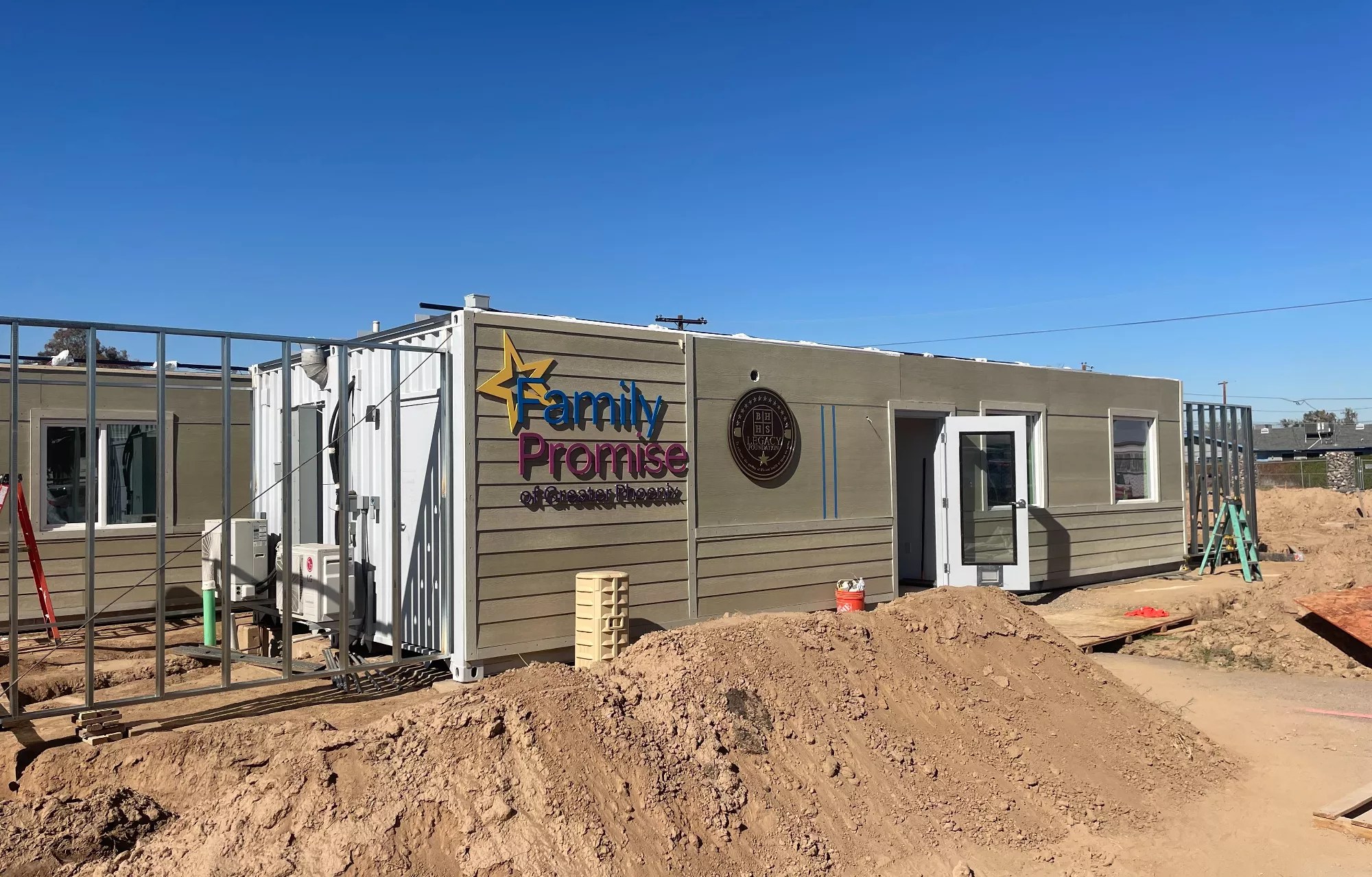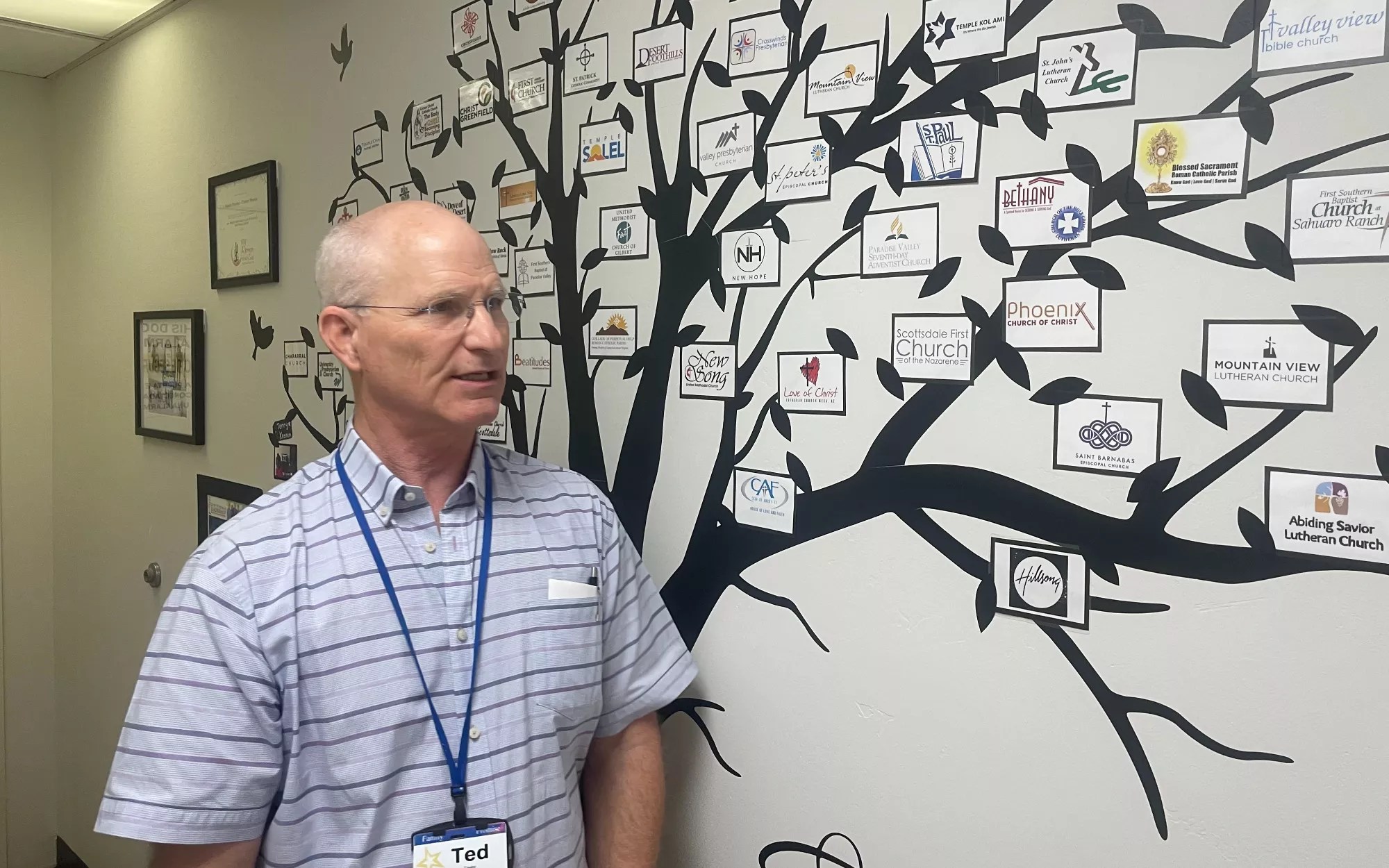
Morgan Fischer

Audio By Carbonatix
In Glendale, hidden behind the small community church First Christian Church of the Discipulos de Cristo, a construction project is underway. Family Promise of Greater Phoenix, a community-based family shelter, is building a small-scale housing development – out of shipping containers.
Dubbed “Family Promise’s Legacy Village,” the development is smack in the middle of the 85301 ZIP code that contains Glendale’s downtown. That’s no coincidence. As Maricopa County heads toward a new evictions record in 2024, the 9-square-mile area has been hit the hardest.
Since October 2023, a whopping 2,878 evictions have been filed in the 85031 ZIP code alone – almost 150 more than any other ZIP code in the county, according to Maricopa County Justice Courts data. More than 21% of renters in the area, which is 46% Hispanic, have faced eviction over the last year, according to Eviction Lab. Just last month, nearly 250 evictions were filed in 85301.
Ted Taylor, the CEO of Family Promise, has seen the area’s problems firsthand. One of the organization’s shelters is just a couple of blocks away from First Christian Church.
“The problem with affordable housing is there’s not enough of it. Arizona is one of the worst in the nation,” Taylor said. “The snowball is getting bigger, not smaller.”
Operating in Phoenix for more than 25 years, Family Promise provides shelter to homeless families in the Valley through its five shelters and partnerships with churches and synagogues. The organization partners with 38 faith communities to host families in their spaces overnight.
Those receiving services through Family Promise eat dinner and sleep at the faith spaces; they are then picked up by the organization the next morning and transported to their jobs or school. Families will spend seven days at a sanctuary before being moved to the next church or synagogue, and then the process restarts. So far this year, 300 families have used the organization’s emergency shelters.
Family Promise does boast a high rate of success. Seventy percent of the families who go through its services will “successfully graduate into affordable housing within 60 days of arrival,” Taylor said. This rate is much higher than traditional shelters, which Taylor said have a rate of around 30%.
But recently, Family Promise has been struggling with overwhelming demand. Its current wait list has more than 360 families on it. The organization has “never seen numbers like that,” Taylor said. Rents have skyrocketed post-pandemic, and it’s becoming increasingly difficult to help families find affordable housing due to scarcity.
“We kept graduating families, and it was getting harder and harder, because finding them homes used to be pretty easy,” Taylor said. “Now, you got to fight for them.”

Family Promise of Greater Phoenix CEO Ted Taylor stands in front of a wall displaying all the organization’s partners across the Valley.
Morgan Fischer
‘We had to do something’
To address that problem, the nonprofit shelter is getting into the housing development business. The project at First Christian Church will be a single-story micro-housing community comprising six 640-square-foot dwelling units converted from shipping containers. The project is 85% done and set to be completed by the end of the month.
The solar-powered two-bedroom units will be fully furnished and move-in ready for unhoused families. Rent will cost between $400 to $950 a month, depending on the unit. Three of the units will be communal housing, in which two families live together in a two-bedroom unit, with combined rent and utilities set at $100 a week. The remaining three units will each house a single family; rent for those units will be $950 a month.
That’s far less than the cost of an average one-bedroom apartment in Glendale, which go for $1,234 a month, according to Apartments.com. For families coming out of homelessness, that may seem like an impossible monthly number to reach. For every 100 units of housing needed for extremely low-income families, only 24 are available, Taylor said. In the 85301 area, 30% of people live below the poverty line and the median income is $45,837 a year, per U.S. Census data.
“We felt like we had to do something,” Taylor said. “Families are struggling.”
That’s where the idea for Legacy Village originated. Family Promise reached out to First Christian Church, which has approximately 70 members. The church, located at 60th Avenue and Rose Lane, had an empty grass and dirt lot on its property.
“We approached a congregation who trusted us,” Taylor said. “Would you lease us some of your land? A little over an acre, to build a community in it where we could serve families?”
The church agreed.
Legacy Village is not permanent housing, however. It’s meant to be a bridge between homelessness and stable living situations for families, who can stay there for only 90 days.
While the development will serve only a handful of families at the First Christian Church location, Family Promise plans to bring this model to other cities and neighborhoods in the area. Its next project is a 20-unit community in Tempe.
“We’re going to make sure it cash flows so that we can continue to replicate,” Taylor said. “There’s a shortage of housing all over this Valley.”